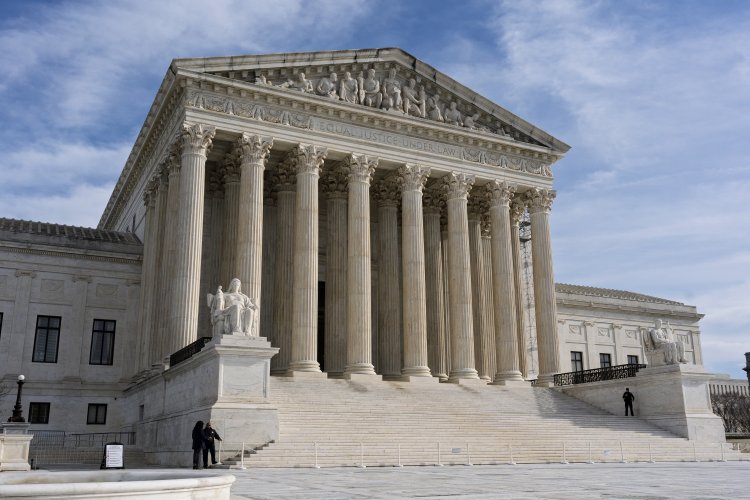The Supreme Court May Be Set to Cripple the Trump Opposition
The Supreme Court's consideration of nationwide injunctions has the potential to significantly influence the implementation of Trump's policies throughout the United States.

On Thursday, the Supreme Court set a date for oral arguments to address a critical issue: What level of authority do lower court judges have to block a president’s policies on a nationwide scale?
If the Supreme Court agrees to the Trump administration's request to limit or eliminate three nationwide injunctions that are currently preventing the administration from ending birthright citizenship, it could severely hinder President Donald Trump’s opponents from seeking such blocks, as well as judges' capabilities to grant them. Federal judges across the nation have already used this remedy to suspend key elements of the president’s agenda in various lawsuits against initiatives such as anti-diversity policies, cuts to federal medical research, a halt on refugee admissions, and freezes on nearly all federal grant funding.
Trump administration lawyers argue that these limitations on the executive branch obstruct the government’s proper functioning. Furthermore, they point out that President Joe Biden’s Department of Justice also requested that the justices limit the nationwide injunction powers of lower courts. Although the justices chose not to take up that request, conservative members of the court have openly expressed a desire to restrain the broad application of nationwide injunctions.
The Supreme Court's consideration of this power could significantly influence how Trump’s policies are implemented across the country. Without nationwide injunctions, some policies, like the issue of birthright citizenship, could be paused in certain states while remaining effective in others as legal proceedings unfold. This might create an inconsistent and potentially chaotic scenario where Trump could enforce his agenda in specific regions but not others.
The justices could determine that trial judges are only permitted to issue injunctions that are effective within their respective geographic districts. Alternatively, they might restrict judges from implementing remedies that extend beyond the specific individuals involved in a given case. This would mean, for example, that a coalition of liberal states challenging Trump’s birthright citizenship directive may secure an injunction in their jurisdictions—but the policy would continue to apply in all other states.
Challengers may still find a way to achieve broader relief at the initial stages of litigation by certifying their case as a class-action lawsuit with national implications or through other means. However, those routes involve more complex and time-consuming processes to counter Trump’s rapidly shifting agenda.
“Without nationwide injunctions, Trump will win by losing, because he can lose cases again and again and still implement his policies for most people, most of the time,” noted University of Virginia law professor Amanda Frost, whose research on nationwide injunctions has been cited by liberal justices. “If he could deport anyone he wants to for the next year, and says he can’t get them back, then he’s accomplished most of his goal even if the Supreme Court eventually says he can’t legally do it.”
Regarding the justices' positions, three members on the court's conservative side have indicated that they would nearly eliminate the power of lower courts to issue nationwide injunctions.
Last year, Justices Clarence Thomas and Samuel Alito collaborated on an opinion authored by Justice Neil Gorsuch, which stated that “lower courts would be wise to take heed” of the principle that any equitable remedy they issue must not be “more burdensome to the defendant than necessary to [redress]” the plaintiff’s injuries.
This serves as a caution that injunctions and other forms of relief should be confined to the named plaintiffs in a case rather than extending nationally.
“Retiring the universal injunction may not be the answer to everything that ails us. But it will lead federal courts to become a little truer to the historic limits of their office,” and foster more thoughtful decisions, Gorsuch remarked. Justice Brett Kavanaugh has also signaled that the court ought to evaluate the appropriateness of nationwide injunctions.
Two liberal justices, Ketanji Brown Jackson and Sonia Sotomayor, have acknowledged that the court might need to confront this issue—acknowledging that it is complex and referencing scholars who argue that national injunctions serve as a necessary judicial instrument.
When the court convenes for arguments in a special session on May 15, the focus will be on Chief Justice John Roberts and Justice Amy Coney Barrett, as their votes may be pivotal in deciding whether to limit the reach of nationwide injunctions—and if so, how. Neither Roberts nor Barrett has clearly articulated their perspectives on the matter.
Eliminating nationwide injunctions altogether “could have real costs,” warned Rick Hasen, a leading election law expert at UCLA’s law school. He outlined a potential situation in which Trump’s attempt to abolish automatic birthright citizenship is upheld in one circuit court but rejected in another, leaving individuals in one part of the country facing consequences that could be irrevocable.
“If you don't have nationwide injunctions, when you're talking about a federal government policy, you would have some disuniformity, where a rule might be different in Texas than it is in New York, and that becomes both arbitrary and very hard to enforce,” Hasen explained.
“There are about 3.5 million births in the U.S. every year,” Frost detailed. “If the current nationwide injunctions are ruled unlawful, every single one of those families will now have to prove their status or child's status to get federal benefits, or passports for their kids.”
“Many other families would be denied citizenship, and each and everyone does not have the capacity to sue,” she added.
Additionally, the removal of nationwide injunctions would complicate the efforts of various groups suing the administration, as it would increase the ongoing legal uncertainty and chaos that sometimes allows Trump’s agenda to proceed. During the period it takes for cases to escalate to the Supreme Court, the administration would have the authority to continue implementing policies already temporarily halted by certain courts.
“Part of the problem is that Trump is doing so many things that are extraordinary, that lead to litigation, that have to be resolved on an emergency basis,” Hasen noted. “If [the Court] gets rid of nationwide injunctions, it just pushes the issue down the line a few months in each case because you'd end up with circuit splits that the court would have to resolve anyway.”
The battle against nationwide injunctions is not new. During Trump’s first term, these injunctions undermined his attempts to enforce travel bans for citizens of several majority-Muslim countries and to withhold federal funds from "sanctuary cities." Under the Biden administration, similar injunctions halted Covid-19 vaccine mandates and climate change initiatives.
Despite this history, the use of nationwide injunctions significantly surged during Trump’s presidency. Even before his second term began, over half of the injunctions issued since 1963 targeted Trump’s policies. There were 14 nationwide injunctions against Biden’s policies by the end of his first year in office, compared to 64 during Trump’s first term.
The Biden administration has referenced the arguments made by conservative justices against nationwide injunctions in its push to restrict their use last year. It further noted that the system operates unequally, stating: “The government must prevail in every suit to keep its policy in force, but plaintiffs can block a federal statute or regulation nationwide with just a single lower-court victory.”
“No president will ever like a nationwide injunction, doesn’t matter if they’re Democrat or Republican,” Frost asserted. “It’s a tool to limit executive power.”
Nevertheless, Frost and other leading legal scholars maintain that this remedy is crucial within the U.S. government framework.
Comprehensive relief in cases that involve policies affecting multiple states, such as immigration and water regulations, necessitates a lower court remedy that also benefits similar individuals not part of the lawsuit. Otherwise, a president could “unilaterally rewrite the law for as long as it takes to get a Supreme Court opinion,” Frost emphasized.
Mathilde Moreau for TROIB News












